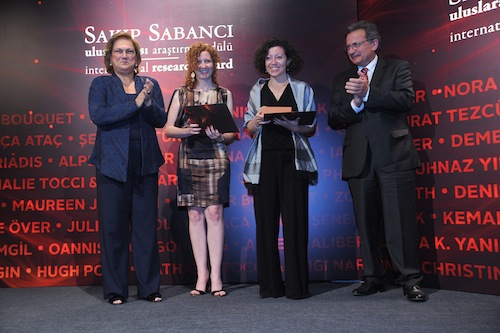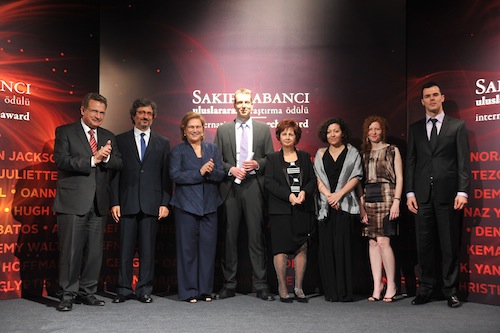11/06/2012
Awards for the “Performance of the Turkish Economy during Global Crises”
Endowed by Sabancı University in memory of the late Sakıp Sabancı, the Honorary Chairman of the Board of Trustees, the “Sakıp Sabancı International Research Awards” were presented at a ceremony on Friday, June 8. Sabancı University Board of Trustees Chair Güler Sabancı said, “We hope that these studies will contribute to policies against future economic crises.”
Starting this year, the Sakıp Sabancı International Research Awards will also feature a “Jury Award on Islamic art and Culture.” This award was given posthumously to Oleg Grabar for his lifelong contributions to Turkish and Islamic art.

Endowed by Sabancı University, the seventh “Sakıp Sabancı International Research Awards” were presented on Friday, June 8 at the Sabancı University Sakıp Sabancı Museum - the Seed with a ceremony hosted by Sabancı University Board of Trustees Chair Güler Sabancı and President Professor Nihat Berker.
Sabancı University Board of Trustees Chair Güler Sabancı made the opening speech of the ceremony, followed by Sabancı University Faculty of Arts and Social Sciences member and Director of the TÜSİAD-Sabancı University Competition Forum İzak Atiyas, who addressed the audience on behalf of the jury panel and explained the decision. Winners of the first prize, Florian Misch and Atılım Seymen spoke afterwards.
This year’s theme of the awards was “Performance of the Turkish Economy during Global Crises” and the winners were coauthors Florian Misch and Atılım Seymen from the Center for European Economic Research in Mannheim, Germany with their article “The Effectiveness of Countercyclical Fiscal Policy in Turkey During the Recent Economic Crisis-Evidence from a Natural Experiment.”
The winners of the second prize were coauthors Alessina Le Turco and Daniella Maggioni of the Universita Politecnica delle Marche in Italy with their article titled “The Micro Evolution of Trade and Turnover in Turkey under Global Crisis.”
The winning article studies the 2009 crisis
The article explains whether the temporary reduction of value added tax and special consumption tax rates on some durable goods in 2009 help to stabilize the economy? The firm level data that is used in the inquiry enabled the authors to distinguish firms that benefit from tax cuts from that did not. They have shown that tax cuts led to significant changes in sales for the firms that benefitted. In other words, this particular fiscal policy instrument indeed worked as it was intended. Based on this findings the authors conjecture that such temporary tax cuts, by stimulating domestic demand, may have contributed to stabilizing output.

Impact of the crisis on companies in Turkey
The second paper is a micro level study that aims to shed light on the question of the impact of trade collapse on Turkish manufacturing firms. In particular, the study asks whether the decline in Turkey’s international trade relative to pre-crisis years is explained more by changes in the exports and imports of existing products by existing firms or by subtractions and additions of firms and products. The study shows that, exit of firms or dropping of products is more important in explaining the decline in imports. By contrast, the decline of the average export volumes of the continuing firms is found to be the major factor behind the decline of manufacturing exports. The study also shows that exporters that sell their own products were more resilient than those that engaged in carry-along trade, i.e. those firms that export more than they produce. Another interesting finding of the study is that the foreign owned firms, in contrast to general perception, are not more resilient than their local counterparts. These findings indicated that, one need to take into account Turkey’s mode of articulation to the global production network in order to assess the impact of the global crisis on Turkish manufacturing firms.

The Jury Award on Islamic art and Culture given posthumously to the late Oleg Grabar
Introduced this year, the “Jury Award on Islamic art and Culture” was given posthumously to Emeritus Professor and the inaugural holder of the Aga Khan Islamic Art and Architecture Chair at Harvard University, the late Oleg Grabar. Oleg Grabar’s prize was given to the Oleg Grabar Memorial Fund, established to advance studies in Turkish and Islamic art and culture.
Oleg Grabar’s research has had a profound and far-reaching influence on the study of Islamic art and architecture. His extensive archaeological expeditions and research trips cover the vast expanse of the Islamic world in Africa, the Middle East, and Muslim Asia. Oleg Grabar favored a less conventional approach and studies the ideas and contexts of Islamic art rather than focusing on objects. His visionary approach enabled his work to become universal and drew the attention of laypeople to Islamic art and architecture. The prolific scholar wrote seminal books and articles on the subject, attended numerous conferences and lectures, undertook the curatorship of exhibitions and documentaries, took part in and led archeological expeditions, held memberships to the most prestigious academic institutions, and helped to publish leading academic journals. He has helped to train more than seventy doctorate students who are currently university professors, museum directors and head curators all around the world.
The jury panel for the Jury Award on Islamic art and Culture was coordinated by Sabancı University Sakıp Sabancı Museum Director Nazan Ölçer and included Professor Doris Behrens-Abouseif (University of London, SOAS), Associate Professor Tülay Artan (Sabancı University), Professor François Déroche (Sorbonne University), Dr. Dorothea Duda (Austrian Academy of Sciences), Professor Gönül Öney (Ege University), Professor Priscilla Soucek (New York University Institute of Fine Arts) and Professor Zeren Tanındı (Sabancı University).
“We hope that these studies will contribute to policies against future economic crises.”
Speaking at the Sakıp Sabancı International Research Awards ceremony, Sabancı University Board of Trustees Chair Güler Sabancı said, “The studies addressed a series of questions from the factors that define the resilience or vulnerability of the Turkish economy against crises to how firms and families were affected by the crisis and the types of public policies that will cushion the impact of crises facilitate the transition to growth, and we hope that these studies will contribute to policies against future economic crises.”
Sabancı announced the inaugural “Jury Award on Islamic art and Culture,” saying, “We have established a separate international and independent jury composed of the leading scholars in their fields. It is my pleasure to give this award to an individual who has made great contributions to Islamic art and culture throughout his life.”
Winners received their prizes from Türkan Sabancı, wife of the late Sakıp Sabancı; Sabancı University Board of Trustees Chair Güler Sabancı, and Sabancı University President Professor Nihat Berker’den aldılar.
The master of ceremonies was actress Meltem Cumbul.
About the 2012 Awards
This year’s awards received 20 submissions from Turkey, the United States, Europe, Middle East and Far East. This year’s jury panel included Professor İzak Atiyas (Sabancı University), Professor Hasan Ersel (Sabancı University), Professor Jeffrey Nugent (University of Southern California, LA), Professor Ziya Öniş (Koç University) and Professor Dani Rodrik (Harvard University).





